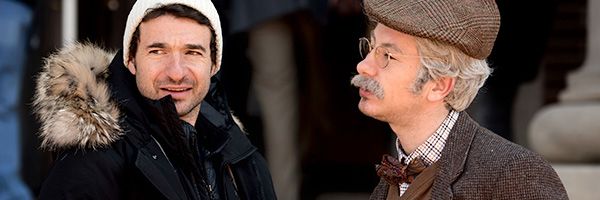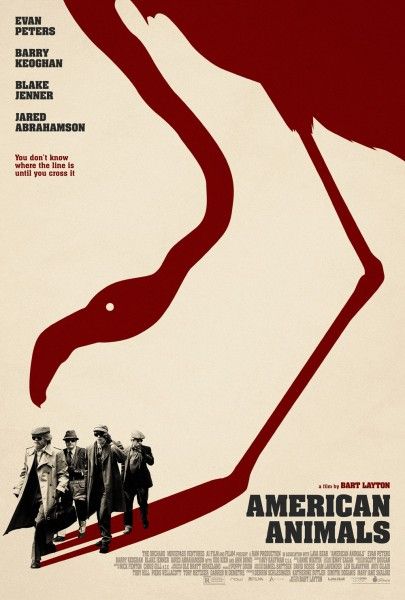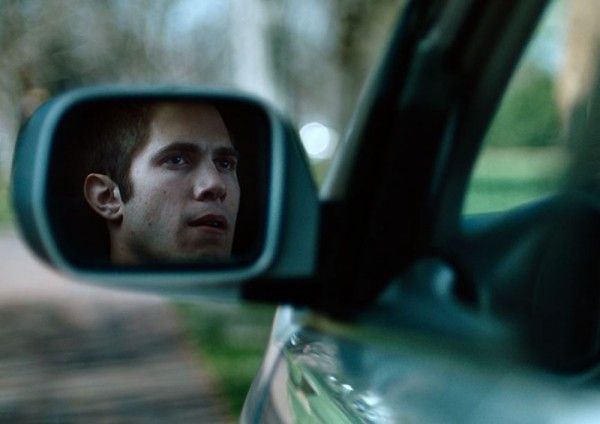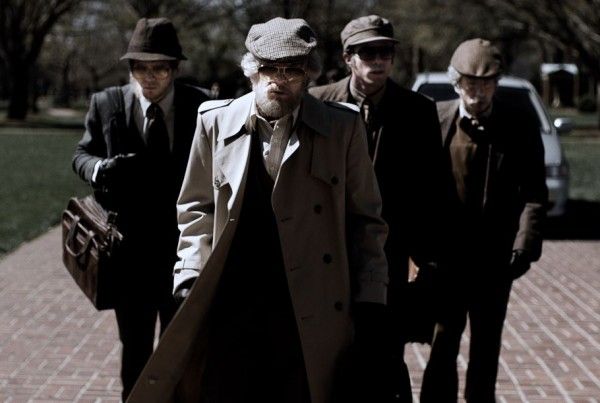From writer/director Bart Layton (The Imposter), American Animals tells the wild and unbelievable true story of four young men who attempt one of the boldest and riskiest heists in U.S. history – taking some of the world’s most valuable books from the special collections room of the Transylvania University library in Kentucky. The story unfolds from multiple perspectives and innovatively incorporates interviews with the real men at its heart, as Warren (Evan Peters), Spencer (Barry Keoghan), Eric (Jared Abrahamson) and Chas (Blake Jenner) go on a roller coaster ride of ups and downs while learning that there’s no such thing as a perfect robbery.
At the film’s Los Angeles press day, Collider got the opportunity to sit down with filmmaker Bart Layton for this 1-on-1 chat about his reaction when he learned about this true story, why he initially wanted to reach out to the real guys while they were in prison, how the movie came about, figuring out how to most effectively weave interviews with the real-life guys into the story he was telling, how the real guys ultimately feel about what they did, putting this cast of actors together, and that he’ll be doing an entirely fictional story next, adapted from the novel Ravens, by George Green.
Collider: When you first learned about this crazy story, what was your reaction? Did you immediately see a movie in it?
BART LAYTON: It seemed so crazy, and he more I read about it, the more crazy it became. It was a great story, but I didn’t know whether it was anything more than that. I didn’t know whether it was more interesting than just a great yearn about a robbery committed by a group of quite unusual criminals. I liked the fact that they stole a copy of The Origin of the Species because there’s this whole Darwinian theme that ran through it about what we’ve evolved into. The more I read about it, the more I was fascinated by what had motivated them to do it, and I wrote to the real guys in prison.
Did they think you were crazy for wanting to make a movie?
LAYTON: Someone had actually already paid a lot of money for their life rights. There was an article in Vanity Fair and someone had auctioned that, so when we first started communicating, there wasn’t really even the ability to tell the story. I was just curious enough to want to get, from them directly, some understanding of what their motivation was. It was the things that they wrote in their letters that made me think, “This is more than just a good story about a great exciting caper. This is about these lost young men, who are searching, in all the wrong places, for an identity and to have a story to tell.” Then, I started to think that it actually felt like a quite timely story about that pressure to live an interesting life, to be special, and all of that. We’re increasingly in a culture where that is the most important thing. It almost doesn’t matter what you’re known for or what you’re remembered. It’s just that there has to be something, whether good or bad, that you have to do to leave a mark on the world. That’s just unrealistic. Most of us are gonna be pretty ordinary.
That’s crazy, especially if you look at something like YouTube and the YouTube channels that people have, where they’re doing the most totally mundane things in front of everybody.
LAYTON: Exactly! They’re looking for validation of their place in the world. It’s like, how interesting am I? How valuable am I? If you’ve got more Twitter followers or Instagram followers, does that make me more valuable in the world? That’s the really fucked bit of it. I felt like some of this crime had to do with those kinds of motivations. That’s what made me think we could talk about this idea through the lens of an exciting heist movie. That was the why of it.
Was it hard to figure out how where to work in the interviews and how much of the real guys to put in the film?
LAYTON: Yeah. You write something in a screenplay and it’s hard to know, especially because I’d never written a screenplay before, let alone one which is as fucked up and unconventional as this one. It’s hard to know whether that thing that works so beautifully on paper will work in the way you think it will. It really did, which was gratifying. You have to find a rhythm. You have to find a way. The idea with it was to reflect their increasing detachment from reality. They get seduced by the fantasy, and they get more and more into it, as we, as an audience, get more and more into it, as well. As you get further into the movie, there’s less non-fiction pieces. It’s more just movie. We always talked about, in their minds, it was like Ocean’s 11, but in reality, it’s like Dog Day Afternoon.
How do these guys feel about what they did?
LAYTON: I think they feel deeply remorseful. I think they probably regretted it, almost the millisecond that they crossed this line that they shouldn’t have crossed. In crossing the line, they betrayed not just their families, but their teachers and all of the people that had loved and invested in them, and I think they did realize the magnitude of that. Something that I wanted to show in the film was this idea that they got to a place where they really wanted to gamble on knowing what happens, if you cross the line. They wanted to know what that felt like. But the truth is, as soon as they had crossed that line, they wanted to cross back, but they couldn’t. They’d done this bad thing and they needed to be redeemed, and the only way to be redeemed was to be punished. The whole thing is ultimately about the cost of crossing a line that you shouldn’t cross.
It seems like you didn’t want to find actors that were exact matches for the real guys, and you didn’t even want them to talk to each other. So, what was it like to cast this? How did you want to approach that?
LAYTON: I didn’t want doppelgangers. I didn’t want look alikes. You just want the best actors. You don’t want people who look like the real guys. I think audiences are so sophisticated that they make those leaps very easily. I feel like, if you treat your audience with enough respect, they respond to that and they realize what the intention is, so we just didn’t stop until we found the best actor. There was a point where the script caught on and it became this thing that, suddenly, we had the ability to cast probably the biggest names, in that age group. That was also something that I wasn’t really crazy about. I didn’t want actors who brought too much baggage with them. I also didn’t want Hollywood pretty boys. I wanted people who felt like you or I. I wanted people who felt quite real and authentic. The whole thing had a relatability to it. I was working with Avy Kaufman, who’s one of the best casting directors around, and we put this ensemble together of people that we just believed could be these kids. Evan [Peters] actually grew up in Missouri, in a small suburban town, and like Warren, he had dreams of something bigger. Rather than completing an art heist, he went and became an actor. For me, Barry [Keoghan] is an actor that you just can’t stop watching. He’s got such a naturalism to him, and he feels very honest. He was someone who liked to be completely in the moment. Evan is almost a method actor. He’s very, very, very well prepared and he over-thinks things, but it works brilliantly for him, whereas Barry comes from the opposite discipline of just showing up and feeling it.
I loved the addition of Ann Dowd, as the librarian. She’s just the loveliest woman, and she really makes you feel for that character.
LAYTON: She is the loveliest person. In addition to that, I feel like she’s one of the best actors of her generation, without a doubt. When she was on set, it raised the bar for everyone. Everyone was on their A-game throughout, the shoot, but when Ann was there, it brought another layer, as well. She is someone that I have always thought was just phenomenal. I didn’t know whether she would be willing to do the role because it’s quite a small part, although it is absolutely pivotal. It’s the heart of the whole film, the humanism of this woman. I just wrote to her and said, “Look, there’s no one else that I would want to do this, so I’m just gonna ask.” We met in Avy Kaufman’s office and had a chat, where I explained why I wanted her to do it and what I saw of her in the character, and vice versa. She said that she’d promised her agent that she wasn’t gonna say yes in the room, but she did say yes in the room, and that was fantastic. It was thrilling.
Did you ever feel bad about what you put her through?
LAYTON: Honestly, because of the way she is, as an actor, she wanted to stay in that place, so she spent most of the week she was with us, bound and gagged and in tears. She’s just an amazing person. I would like to never have to make a movie without Ann Dowd in it. She wrote to me afterwards, saying it was one of her most rewarding experiences on a film set. I was like, “I can’t believe that, given that you spent the whole week handcuffed and with tape across your mouth, on the ground.”
Have you decided what you want to do next?
LAYTON: I feel like this was an itch that needed to be scratched. I wanted to see if there was another way of telling a true story that we haven’t really seen before, and the effect of it is one of a heightened emotional investment that’s greater than the sum of its parts. I had a very strong suspicion that it would work and that the story would benefit from this kind of hybrid form of storytelling. It was something that I needed to get out my system. It’s like the end of a journey. Now, I feel like I can put that to bed. The next thing I’m going to do is not a true story. Weirdly, it’s a fictional story, but it’s probably more believable than this of The Imposter. It touches a lot on the idea of subjective truth. It’s a story about a charlatan, and people decide that they would rather choose the version of this person that they want, instead of the reality of who the person is. They want to invest in believing that this person is a savior. I hope that it will have a quality to it where it feels very truthful. For me, the crucial thing is finding a story where you can’t stop wondering what’s gonna happen next, but if it doesn’t speak to a more interesting conversation about how we live or the culture, then it has to be a way into something a bit more relevant. It can’t just be a good story for the sake of it.
Does that film have a title?
LAYTON: Well, it’s an adaptation of a book called Ravens, by George Green. It’s a great book. I highly recommend it. It’s amazing. It’s got two leads. It’s a really great vehicle for two male actors and one female.
American Animals opens in select theaters on June 1st.




